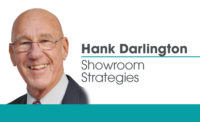The death of Michael Jackson recently was a tragic event. No matter what you thought of Michael personally, there is no doubt that he was one of the most talented entertainers of all time. His singing and dancing talent showcased so effectively by his performance in the video and album “Thriller” will be remembered forever as the capstone of his career. I, like millions of his fans, mourn his passing.
However, the one thing that I remember the most is his invention of the “Moonwalk.” The “Moonwalk” is a dance move that looks as if you are going forward when in reality you are moving backward. Michael made that move famous. His tragic, sorrowful death reminded me of that move. The Moonwalk itself brings to mind how many businesses often struggle to achieve success, doing things that are supposed to gain market share and create success. And yet, many find that even though they believe they are doing all the things the “experts” say they should be doing, real success eludes them. They feel like they are moving forward but in reality they are moving backward. They are doing the “Moonwalk.” This can be particularly evident during tough economic times.
Make Sure You are Relevant and Current
You need to be relevant and current. Don’t get stuck in the past with practices that may have put you in a comfort zone because business was so good. Most of the time there is no shortcut to success. Relevance is more than just following best practices. It is more than just developing a contingency plan. Every effective leader I have ever known understood this principle. They are aware that their impact on the success of their organization was based on their vision and values and the core beliefs they shared with all their employees.Focusing on “the positives of the past” is a valiant intention to be sure. I wonder, though, how realistic and relevant past practice is if past success was simply the result of economic conditions and not effective leadership and a solid management team. If that is the case, you will simply begin doing the “Moonwalk” with no real vision-based plan to deal with the current economic situation. Good anecdotes, memos to employees and resting on past success and past practice with little success substance will not solve today’s problems.
Being current and understanding the real challenges you face is just as important as making sure it is relevant. Running a responsible business isn’t something you just decided to do overnight. Hopefully you have been making conscious best practice business decisions for a long time and you are still learning as you go. Every step along this path during an economic crisis is important, from high-level market-driven decisions to individual employee relationships. Take the time to review best practices as they apply to your business. Look at your processes, your procedures and your policies. Do they reflect good management principles or do they become a little spongy due to past practices? Are they relevant to what is happening in your markets today?
A Vision is Still Critical
Businesses focused on developing sustainable long-term market share growth during tough economic times often have a longer time-horizon and a broader set of goals than companies that have not stayed current and relevant to their market place. Typically they are dissatisfied with the status quo. Not only have they developed contingency plans for the short term to deal with the economic crisis, but they have not abandoned their long-term strategic vision for the company. Albeit, they may adjust it according to current relevancy.To succeed in today’s economic environment, leadership must build a foundation that allows the creative energy released by employees to actually work. We must leverage employee dedication and sacrifice that stems from ownership of the vision-values and core beliefs that have been engrained into the culture of the organization. The CEO or owner of this type of company generally conveys a well-articulated set of principles that guide the business and help to instill the same values in employees. By declaring their goals publicly this type of leader inspires trust and respect, which is the baseline for employee commitment to success during tough economic times and long-term growth.
This broader vision of success requires new business tools, practices and relationships. Being receptive to new ideas and suggestions opens the door to an array of business opportunities. That’s what being current and relevant is all about. You cannot afford to wallow in a pool of pessimism and past practice without opening your mind to new ideas and new options.
Be Open-Minded
The Internet revolution brought on many changes to the market place and presented enormous opportunity. Before this revolution took place, undertaking large projects, entering new markets or working globally was the exclusive privilege of large corporations and conglomerates.In this century, innovative use of ‘virtual’ corporations, strategic alliances and other partnerships and ventures means smaller companies can now compete and generate business outside their traditional markets. Communication technology allows global orientation for even the smallest business and the greater efficiencies that can be offered by a team of small players enable these firms to perform on the global stage.
Dealing with economic crisis requires the application of sustainable business principles that are current and relevant. You must maintain a forward momentum regardless of circumstance. Realize that every problem and challenge you face on a day-to-day basis as a result of the faltering economy are the same issues and challenges faced by your competitors. Ask yourself this question: “Can you outperform the competition?”
Improvements in your sustainable business practices must come from new ways of thinking about meeting customer needs and redesigning operations with a priority focus on servicing your customer. You can’t afford to do the “Moonwalk” if you are to thrive during tough economic times. Prepare yourself and your management team to be forward-thinking and open to new ideas.
Focusing on Qualitative Market Share Growth
One of the biggest challenges in creating a sustainable future and gaining market share in a tough economy is the ability to refocus policy and practices across a variety of functions. The focus on revenue growth was appropriate prior to the current economic environment, when “fish were jumping in the boat.” Today, however, focus must be on market share as opposed to top line growth. Remember, if sales decline by 10% but the market itself declines by 20%, you have effectively gained market share. This is an important principle that everyone on your team must understand. High-performing organizations integrate market share focus and performance management best practices more than other organizations. Conversely, low-performing organizations consistently underutilize these best practices and lose focus on market share.Execute the Plan
The inability of organizations to effectively execute their contingency or strategic plans is one of the major factors limiting success - success measured by market share growth. Recent management research and literature has thoroughly documented the importance of execution in creating success during tough economic times. Organizations execute their strategies through the creation of contingency plans and strategic initiatives, comprising any number of initiatives, programs and projects that become the vehicles for realizing the corporate vision that is current and relevant.Whether a company ultimately succeeds or fails during these economic times depends on the effectiveness of the actions taken to deal with current challenges. Before these actions can be taken, however, companies must recognize these challenges for what they are to take appropriate actions.






